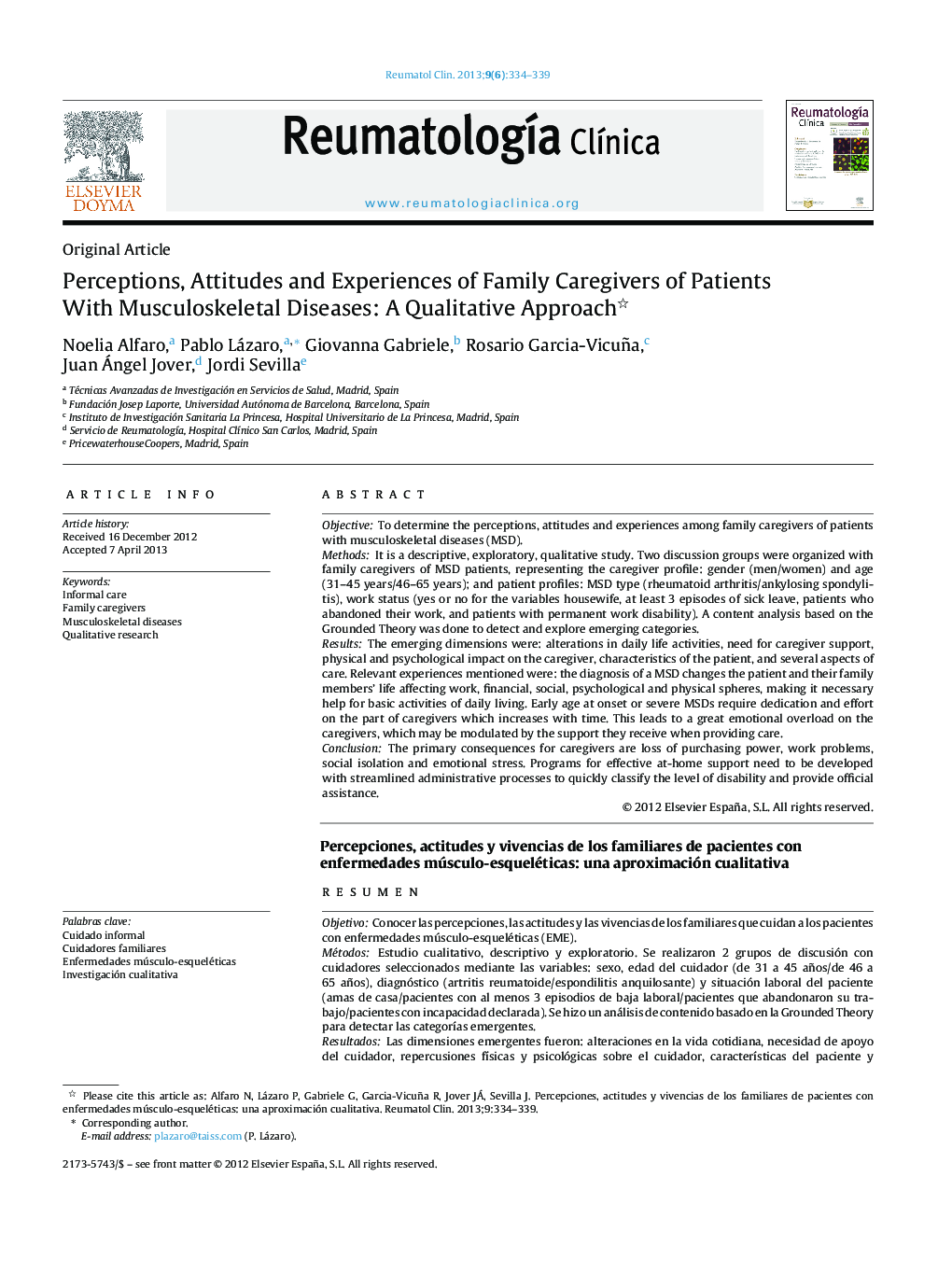| کد مقاله | کد نشریه | سال انتشار | مقاله انگلیسی | نسخه تمام متن |
|---|---|---|---|---|
| 3384400 | 1220527 | 2013 | 6 صفحه PDF | دانلود رایگان |

ObjectiveTo determine the perceptions, attitudes and experiences among family caregivers of patients with musculoskeletal diseases (MSD).MethodsIt is a descriptive, exploratory, qualitative study. Two discussion groups were organized with family caregivers of MSD patients, representing the caregiver profile: gender (men/women) and age (31–45 years/46–65 years); and patient profiles: MSD type (rheumatoid arthritis/ankylosing spondylitis), work status (yes or no for the variables housewife, at least 3 episodes of sick leave, patients who abandoned their work, and patients with permanent work disability). A content analysis based on the Grounded Theory was done to detect and explore emerging categories.ResultsThe emerging dimensions were: alterations in daily life activities, need for caregiver support, physical and psychological impact on the caregiver, characteristics of the patient, and several aspects of care. Relevant experiences mentioned were: the diagnosis of a MSD changes the patient and their family members’ life affecting work, financial, social, psychological and physical spheres, making it necessary help for basic activities of daily living. Early age at onset or severe MSDs require dedication and effort on the part of caregivers which increases with time. This leads to a great emotional overload on the caregivers, which may be modulated by the support they receive when providing care.ConclusionThe primary consequences for caregivers are loss of purchasing power, work problems, social isolation and emotional stress. Programs for effective at-home support need to be developed with streamlined administrative processes to quickly classify the level of disability and provide official assistance.
ResumenObjetivoConocer las percepciones, las actitudes y las vivencias de los familiares que cuidan a los pacientes con enfermedades músculo-esqueléticas (EME).MétodosEstudio cualitativo, descriptivo y exploratorio. Se realizaron 2 grupos de discusión con cuidadores seleccionados mediante las variables: sexo, edad del cuidador (de 31 a 45 años/de 46 a 65 años), diagnóstico (artritis reumatoide/espondilitis anquilosante) y situación laboral del paciente (amas de casa/pacientes con al menos 3 episodios de baja laboral/pacientes que abandonaron su trabajo/pacientes con incapacidad declarada). Se hizo un análisis de contenido basado en la Grounded Theory para detectar las categorías emergentes.ResultadosLas dimensiones emergentes fueron: alteraciones en la vida cotidiana, necesidad de apoyo del cuidador, repercusiones físicas y psicológicas sobre el cuidador, características del paciente y descripción de los cuidados. Entre las vivencias destaca que el diagnóstico de una EME altera la vida del paciente y los familiares, repercute en la esfera laboral, económica, social, psicológica y física llegando a necesitar ayuda para las actividades básicas de la vida diaria. Las EME diagnosticadas a edades tempranas o muy incapacitantes, exigen dedicación y esfuerzo en los cuidados que aumentan con el tiempo. Esto produce una gran sobrecarga emocional en el familiar, modulada por el apoyo recibido para cuidar.ConclusiónLas principales consecuencias detectadas para los cuidadores son pérdida de poder adquisitivo, problemas laborales, aislamiento social y su sobrecarga emocional. Se precisa desarrollar programas de apoyo domiciliario eficaces, con trámites oficiales ágiles para poder clasificar rápidamente el grado de discapacidad y así poder tramitar ayudas oficiales.
Journal: Reumatología Clínica (English Edition) - Volume 9, Issue 6, November–December 2013, Pages 334–339